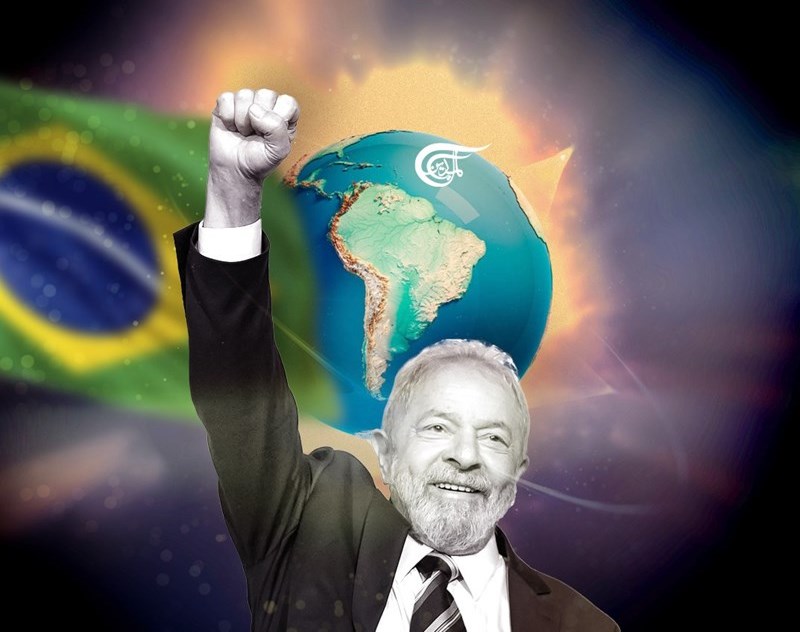Latin America between hope and dangers
The main economies of Latin America are governed by left-wing parties, which strengthen the possibility of greater regional integration and joint efforts to face the difficult international economic situation and the inevitable hegemonic plans of the US in the region.
The massive and emotional inauguration of Luiz Inácio Lula Da Silva in Brazil, on the first day of the year, and the announcement in Colombia of the beginning of a ceasefire with five armed organizations in that country is the news that illuminates with hope the beginning of the year in Latin America and the Caribbean.
Lula assumes for the third time the presidency of a Brazil harshly isolated and battered by Bolsonaro’s era. The former union leader now leads a country very different from the one he received in 2003, in his first presidency: economically weakened by inflation and debt, with exponential exacerbation of poverty conditions and inequalities, extremely polarized and with a right-wing Congress, heavily influenced by Bolsonarism.
“It is necessary for people to know how we found this country: They emptied health resources, dismantled education and culture; They destroyed the environment; They left no resources; They disorganized the governance of the economy, public financing, support for businesses and entrepreneurs; They squandered state-owned companies and public banks; They handed over the national patrimony; They left a budgetary disaster”, he asserted during his speech at the presidential inauguration ceremony.
For Colombia, hard hit by decades of conflict, the step taken to start 2023 is very significant. “We have agreed on a bilateral ceasefire with the ELN, the Second Marquetalia, the Central General Staff, the AGC, and the Self-Defense Forces of the Sierra Nevada from January 1 to June 30, 2023, extendable depending on progress in the negotiations”, President Gustavo Petro tweeted. “Total peace will be a reality”, the President promised.
“This is a bold act. The bilateral ceasefire obliges the armed organizations and the state to respect it. There will be a national and international verification mechanism”, added the President in another publication.
These are two testimonies of how the political left and progressivism can bring changes to a Latin America that in recent years has experienced a period of neoliberal restoration at the hands of right-wing governments such as Macri, Bolsonaro, and Duque.
Lula’s inauguration completes an electoral cycle that has allowed the arrival or reaffirmation of progressive governments in Mexico, Bolivia, Chile, Nicaragua, Colombia, Peru, Honduras, and Brazil. Each one of them with its own characteristics and different radicalism, but all of them were fitted with the projection of greater social justice and an integrating vocation.
They are joined by the governments of Cuba and Venezuela, whose political processes are being maintained against all odds, despite enormous pressure from Washington.
Thus, the main economies of Latin America are governed by left-wing parties, which strengthens the possibility of greater regional integration and joint efforts to face the difficult international economic situation and the inevitable hegemonic plans of the US in the region. These are the two main problems to be faced in this rebirth of Latin American progressivism.
The new progressive wave comes in the midst of an economic context that threatens governability and the extension of social programs. An uncertain international scenario with a combination of factors including economic slowdown, inflation, financial volatility, and lower capital flows, has slowed growth in Latin America and the Caribbean in 2022 and will further deepen this downward trend in 2023, the Economic Commission for Latin America and the Caribbean (ECLAC) recently predicted.
In its new report Preliminary Overview of the Economies of Latin America and the Caribbean, ECLAC said the region will grow 3.7 percent in 2022, almost half the 6.7 percent recorded in 2021; and only 1.3 percent next year.
If the projected outlook for next year materializes, it would be the second lost decade since the 1950s, with meager regional growth of 0.9 percent since 2014. In the so-called “decade of the debt crisis” in the 1980s, the economy advanced by two percent. That was so far the lowest performance since 1951.
Under these circumstances, there will be fewer resources to pay for the social programs required by these nations and proposed by the governments that came to power with popular welfare agendas.
Another concrete danger for progressive governments is that in some cases, as in Brazil, Peru, and Chile, parliaments are dominated by the right wing, which seeks to hinder government plans and sabotages proposals that imply a significant change in the status quo of capital domination.
The rejection of the new Constitution in Chile, the defenestration of Castillo as President in Peru, and the manipulated judicial condemnation of Cristina Fernandez are examples of the power retained by conservative forces in the region.
The pretensions of reinforcing integrationist processes, as the new regional scenario may propitiate, face the challenge of US domination purposes, clearly established in the Biden administration’s National Security Strategy.
The strategy asserts that no region impacts the United States more directly than the Western Hemisphere and states that the United States will continue to build “regional security” by supporting efforts to confront both domestic and organized crime threats, as well as external threats from “malign actors” seeking to establish a military or intelligence presence in the region, in a clear reference to China and Russia.
China is today the main trading partner of several Latin American economies and has an alliance with CELAC that has been deepened in recent years.
Added to this is the role played by the OAS, under Washington’s mandate, to divide the region and sabotage popular processes in several countries.
Beyond these threats, there is no doubt that there is a hopeful political correlation between Latin America and the Caribbean, which can put integration processes back on track, give strength to the regional voice and attenuate the harsh impact on the popular sectors of the international economic crisis and the exclusionary policies applied by right-wing governments in the region.
Skill and political determination will be decisive in the course of events. The leadership of Lula, López Obrador, Fernandez, and Petro, together with the strength of the ALBA governments can make the difference.
You can read the original article here.

 Randy Alonso Falcón
Randy Alonso Falcón
 6 Min Read
6 Min Read








